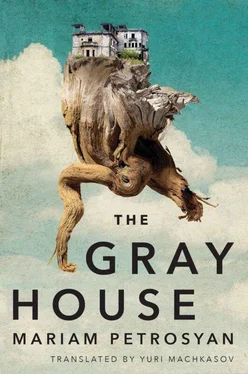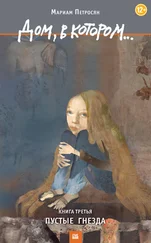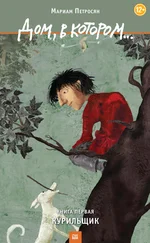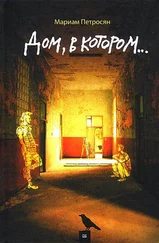Nobody likes Gray House. No one would admit it openly, but the inhabitants of the Comb would rather not have it next to them. They would rather it didn't exist at all.
They approached the House on a hot August day, at the hour that chases away the shadows. A woman and a boy. The street was deserted; the sun had burned everyone away. The meager trees along the sidewalk failed to protect from its rays, as did the walls of the buildings—the melting white teeth in the blindingly blue sky. The pavement gave way under the feet. The woman's heels left small dimples in it, and the neat sequence of them followed her like the tracks of a very unusual animal.
They moved slowly: the boy because he was tired, and the woman because of the weight of the suitcase. They both wore white, both were fair-haired and seemed slightly taller than one would expect: the boy, incongruous with his age, the woman, with her femininity. She was beautiful, used to being the center of attention, but there was no one to gawk at her now, and she was glad of it. The suitcase had put a kink in her step, her white suit was crinkled from the long bus ride, her makeup blotchy from the heat. She countered all that with a proudly held head and a straight back, determined not to show how tired she was.
The boy was as like her as a smaller specimen of the human race can be like a bigger one. His hair was so fair it sometimes seemed tinged with red, he was lanky and a bit gangling, and the eyes looking out at the world were the same shade of green as his mother's. He also carried himself in the same upright manner. A white blazer was hugging his shoulders, a peculiar choice in this weather. He was dragging his feet, catching the sneakers against each other, and kept his eyes half-closed so that he could see only the bubbling gray pavement and the marks being left on it by his mother's shoes. He was thinking that even if he lost sight of her he'd still be able to find her by following the trail of those silly punctures.
The woman stopped.
The House loomed over them, bordered by emptiness on both sides, an ugly gray breach in the dazzling rows of the Comb.
“This must be the place.”
The woman lowered the suitcase to the ground, took off the sunglasses, and studied the sign on the door.
“See? We got here in no time at all. No need to take a taxi, right?”
The boy nodded indifferently. He could have pointed out that it was quite a long walk, but instead he said, “Look, Mom, it must be cold to the touch. The sun can't touch it. Weird, huh?”
“Nonsense, dear,” the mother brushed him off. “The sun touches everything within its reach. It's just darker than the other houses, so it looks cooler. I am going to step inside for a minute, and you just wait for me here. All right?”
She heaved the suitcase up to the fourth step and leaned it against the railing, then rang the bell and stood still. The boy sat down at the bottom of the stairs and looked away. He turned back around at the sound of the lock but could only catch a glimpse of the white skirt disappearing behind the door. The door clicked shut and he was alone.
The boy rose from the steps, went and put his cheek against the wall.
“It is cold,” he said. “It's not within the sun's reach.”
He ran a little distance off and looked at the House from there. Then glanced guiltily back at the stairs, shrugged, and started walking along the wall. He reached the end of it, looked back one more time, and turned the corner.
Another wall. He ran the length of it and stopped.
Around the next corner he saw a backyard behind a chain-link fence. It was empty and dull and just as scorching as everything around it. The House itself, however, was completely different from this side. Colorful and cheery, as if it had decided to show another face to the boy, a face that was smiling. That was not for everyone.
The boy came up against the fence, to look at that face closer and maybe even guess who was painted on the walls. He saw a rickety structure made from cardboard boxes. A playhouse covered with twigs. Its roof was decorated with a flag, now limp in the still air, and the cardboard walls were hung with pretend weapons and small bells. The hut was inhabited. He could hear voices and noises from it. Several bricks surrounded a pile of black ashes near the entrance.
They are allowed to build fires ...
He pressed against the fence, not noticing that it was imprinting a rusty lattice on his shirt and blazer. He did not know who “they” were, but it was obvious that “they” couldn't be that old. He looked and looked until he himself was noticed through the roughly cut-out window.
“Who are you?” a slightly hoarse child's voice inquired, and then a bandana-wrapped head appeared in the hut's doorframe. “Go away. This is not a place for strangers.”
“Why not?” the boy asked, intrigued.
The hut swayed and let out two inhabitants. The third stayed inside by the window. Three faces, brown and painted, were staring at him through the fence.
“He is not from those,” one said to the other, nodding at the teeth of the high-rises. “He's not from around here. Look at him, just staring.”
“We came by bus,” the boy in the blazer explained. “And then we walked.”
“So just keep walking,” came the advice from beyond the fence.
He stepped back. He wasn't offended. These were strange boys. There was something not quite right about them. He wanted to understand what it was.
They, in their turn, were studying and discussing him openly.
“He must be from the North Pole,” said the little one with the round head. “Look at that coat. What a moron.”
“Moron yourself,” the other said. “He's got no arms, that's why he's wearing it. They're leaving him with us. See?”
They exchanged glances and started giggling. The one inside the hut laughed so hard that it started swaying.
The boy in the blazer took some more steps away from them.
They continued laughing.
“Staying with us, with us!”
He turned on his heel and ran, squaring his shoulders awkwardly to prevent the blazer from flying off.
He rounded the corner and crashed straight into someone who grabbed him.
“Hey, careful! What's the matter?”
The boy shook his head. “Nothing. I'm sorry. I need to be over there. Please let me go.”
But the man didn't.
“Come with me,” he said. “Your mother is in my office. I was already starting to worry about what I would have to tell her if I couldn't find you.”
The man belonged to the cool house. He had blue eyes and gray hair and a hooked nose, and he squinted the way people who wear glasses usually do. They went up the steps, and the man from the House picked up the suitcase. The door was ajar. He stepped aside for the boy to come in.
“Those... in the hut. Do they live here?” the boy asked.
“They do,” the blue-eyed man said eagerly. “Have you met already?”
The boy did not answer.
He stepped inside, the House man followed him, and the door clicked shut behind them.
They lived in a room with shelves and shelves of toys, the boy and the man. The boy slept on the sofa, hugging a stuffed crocodile; the man, on a camp bed he had set up next to it. When he was alone, the boy would go out on the balcony, lie on an air mattress, and look down through the railing at the boys playing. He would sometimes stand up so they could see him too. The boys would raise their heads and smile at him. But they never asked him to join them down there. He was secretly hoping for the invitation, but it never came. Disappointed, he'd lie back again and look down from under the brim of a straw hat, taking in the high voices from below. Sometimes he'd close his eyes and imagine himself dozing off on a beach, lulled by the soft swishing of the surf. The boys' voices morphed into seagull cries. The sun was turning his legs brown. The idleness bored him.
Читать дальше

![Мариам Петросян - Дом, в котором… [Издание 2-е, дополненное, иллюстрированное, 2016]](/books/62844/mariam-petrosyan-dom-v-kotorom-izdanie-2-thumb.webp)









